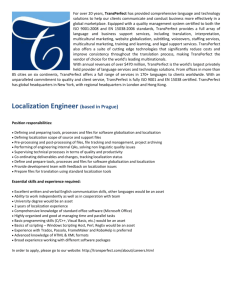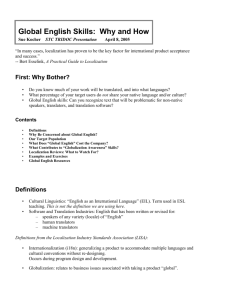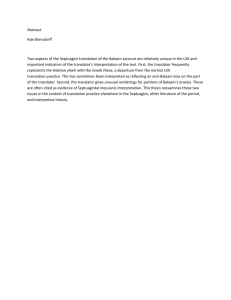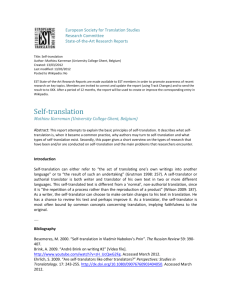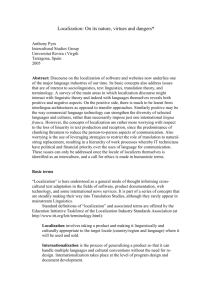paper_47 - School of Literature, Media, and Communication
advertisement
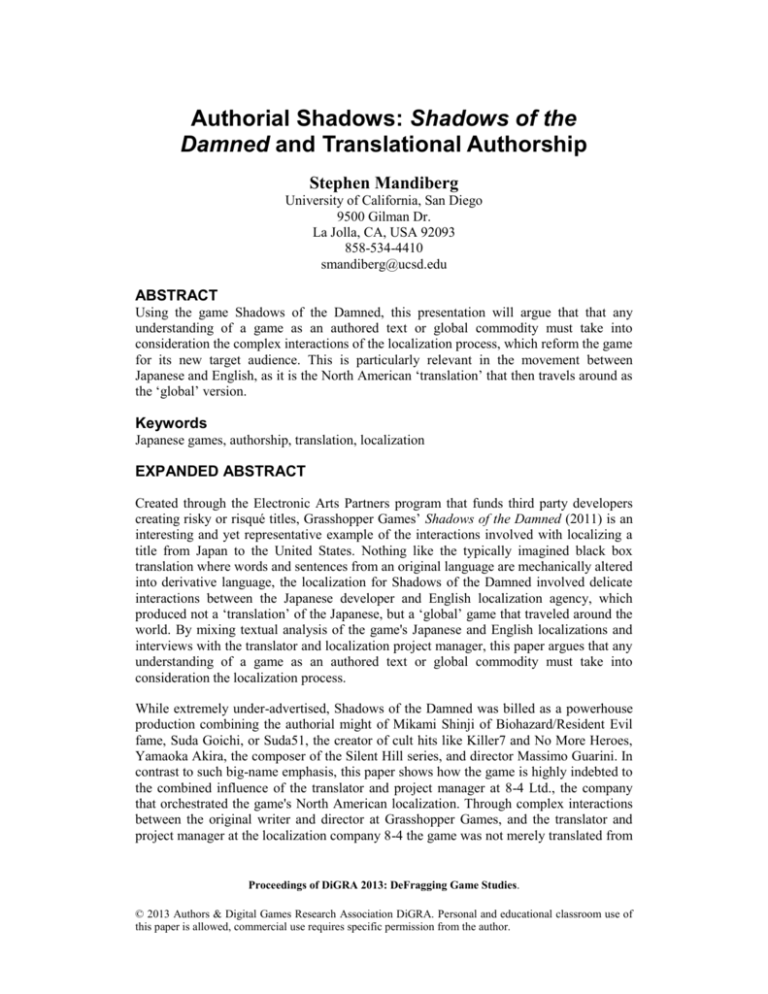
Authorial Shadows: Shadows of the Damned and Translational Authorship Stephen Mandiberg University of California, San Diego 9500 Gilman Dr. La Jolla, CA, USA 92093 858-534-4410 smandiberg@ucsd.edu ABSTRACT Using the game Shadows of the Damned, this presentation will argue that that any understanding of a game as an authored text or global commodity must take into consideration the complex interactions of the localization process, which reform the game for its new target audience. This is particularly relevant in the movement between Japanese and English, as it is the North American ‘translation’ that then travels around as the ‘global’ version. Keywords Japanese games, authorship, translation, localization EXPANDED ABSTRACT Created through the Electronic Arts Partners program that funds third party developers creating risky or risqué titles, Grasshopper Games’ Shadows of the Damned (2011) is an interesting and yet representative example of the interactions involved with localizing a title from Japan to the United States. Nothing like the typically imagined black box translation where words and sentences from an original language are mechanically altered into derivative language, the localization for Shadows of the Damned involved delicate interactions between the Japanese developer and English localization agency, which produced not a ‘translation’ of the Japanese, but a ‘global’ game that traveled around the world. By mixing textual analysis of the game's Japanese and English localizations and interviews with the translator and localization project manager, this paper argues that any understanding of a game as an authored text or global commodity must take into consideration the localization process. While extremely under-advertised, Shadows of the Damned was billed as a powerhouse production combining the authorial might of Mikami Shinji of Biohazard/Resident Evil fame, Suda Goichi, or Suda51, the creator of cult hits like Killer7 and No More Heroes, Yamaoka Akira, the composer of the Silent Hill series, and director Massimo Guarini. In contrast to such big-name emphasis, this paper shows how the game is highly indebted to the combined influence of the translator and project manager at 8-4 Ltd., the company that orchestrated the game's North American localization. Through complex interactions between the original writer and director at Grasshopper Games, and the translator and project manager at the localization company 8-4 the game was not merely translated from Proceedings of DiGRA 2013: DeFragging Game Studies. © 2013 Authors & Digital Games Research Association DiGRA. Personal and educational classroom use of this paper is allowed, commercial use requires specific permission from the author. Japanese into English, but completely rewritten from the ground up in English and sold around the world. A claim that such extensive translational rewriting is important poses a challenge to the existing game studies literature that rarely looks at the work of video game translators as authorial outside of a few specialized works focusing on game localization (BernalMerino 2006; Mandiberg 2012; O'Hagan and Mangiron 2013). Existing work tends to approach authorship as either a distributed act between the multitude of developers (Huber 2008), a distributed act that combines both industry and fan communities (Jenkins 2006), or the work of directors, producers and writers alone as 'authors' (Aarseth 2004; Demirbas 2008). Following an established tradition in translation studies (Pym 2009; Venuti 1995; Zeller 2000), this paper argues that many Japanese games, like Shadows of the Damned, are equally authored by the localization team, as the current practice of localization is not one of original and derivative, but construction through translation. The argument that modern localization works to create the core game, and that localizers are in fact authors, is important for humanities understandings of games as textual artifacts, as it changes the contextual and cultural background of the text itself. It is also crucial for cross cultural, social and behavioral science research, as any study into cultural or player reception must necessarily be understood through the lens of the interactions that went on in order to tailor particular versions for particular audiences. BIBLIOGRAPHY Aarseth, E. (2004). “The Game and its Name: What is a Game Auteur?” In Visual Authorship: Creativity and Intentionality in Media, edited by. Torben K. Grodal et al. Copenhagen: Museum Tusculanums Press. Bernal-Merino, M. (2006). "On the Translation of Video Games." Journal of Specialized Translation, no. 6: 22-36. Demirbas, Y. (2008). "Video Games and Auteur Theory." International Design and Cinema Conference, DESIGN CINEMA 2008. Istanbul, November 19-22. Grasshopper Manufacture. (2011). Shadows of the Damned. [Playstation 3], Electronic Arts. Localized by 8-4 Ltd. Played January 1, 2013. Huber, W. (2008). "Soft Authorship." SoftWhere 2008: Software Studies Workshop. San Diego. Jenkins, H. (2006). Fans, Bloggers, and Gamers: Exploring Participatory Culture. New York: New York University Press. Mandiberg, S. (2012). "Translation and/as Interface." Loading... 6, no. 10: 53-70. O'Hagan, M. and Mangiron, C. (2013). Game Localization: Translating for the Global Digital Entertainment Industry. Amsterdam; Philadelphia: John Benjamins Pub. Co. Pym, A. (2009). "The Translator as Non-Author, and I Am Sorry About That." In Il Traduttore Come Autore. Universita per Straniere di Siena, Italy. Venuti, L. (2008 [1994]). The Translator's Invisibility: A History of Translation. 2nd ed. New York: Routledge. Zeller, Beatriz. (2000). "On Translation and Authorship." Meta 45, no. 1: 134-39. -- 2 --
